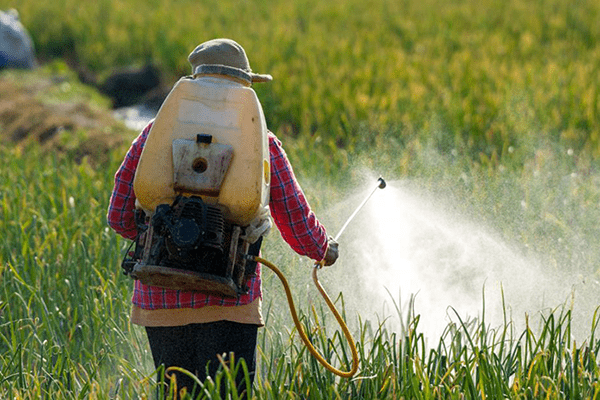|
RCBJ-Audible (Listen For Free)
|
James Sklar Seeking Support From Zebrowski, Weber, Other Elected Officials To Amend NY Law To Give Local Municipalities Control Over Pesticide Use
By Tina Traster
James Sklar bristles when you say people want a “perfect green lawn.” The environmental activist believes the sought-after green lawn is “imperfect” because it’s killing beneficial weeds, natives, and leaves. What’s worse, to attain that manicured, postcard-perfect appearance, lawns must be treated with harmful pesticides – and this is what has activated Sklar to fight.
The Nyack resident, a former restaurateur, foodie, and yoga teacher, is gathering signatures for a petition that would seek a change of law at the state level to force a conversation in the Village of Nyack about whether to ban pesticides.
Sklar is a man on a mission – but he has an uphill climb because he needs an Assemblyman or Senator to sponsor a bill to amend New York State Law, which has jurisdiction over distribution, sale, use and transportation of pesticides. According to the New York State Department of Conservation, a local town or municipality in New York can control the use of pesticides on government-owned property but they have no authority beyond that.
“Residents would need to lobby New York State legislators to amend the New York State law,” said an unnamed official of the Pesticide Enforcement and Compliance Assurance Section, Bureau of Pesticides Management in an email to Sklar in April. “The village would not have the authority to pass a local law or ordinance for a village-wide ban on the use of pesticides.”
Sklar’s campaign will be a steep climb and one that will involve educating landscapers, landlords, even residents because the aesthetics of suburban culture have long valued a groomed, green carpet. He has gathered 250 email signatures to date on an online petition to change the State Law, and has been lobbying elected state officials like Senator Bill Weber and Assemblyman Ken Zebrowski.
“I am currently reviewing this proposal and my office has been in contact with Mr. Sklar to speak about this issue,” said Assemblyman Zebrowski. “Recently, the Assembly passed the Birds and Bees Protection Act, which would restrict the use of neonicotinoid pesticides, and I will continue to examine legislation that would protect the public from harmful pesticides.”
Weber also said he’s looking into the matter.
“The safety of Rockland residents is of paramount importance, and I commend James Sklar for wanting to keep people safe,” said Senator Weber. “Immediately after James reached out to my office, I instructed my legislative staff to research the matter, and we also contacted the DEC to determine what safety measures they have in place for pesticide regulation.”
It will be a tough road but Sklar’s committed to the issue.
“This is something near and dear to my heart,” said Sklar, who has lived an organic-centric life for nearly 30 years but feels compelled to do more to save the planet, particularly in the Village he loves. Sklar says he’s spent time in recent months trying to track down what pesticides are being applied at apartment buildings and commercial sites in the village with little to no luck.
“There’s a lot of support but it’s a long haul and a heavy lift,” he said. “I see the little yellow signs that warn people pesticides have been sprayed and it upsets me. It affects everyone. Animals that roam. And especially people or employees who are applying the sprays. They are on the front lines of toxicity.”
Widespread, long-term use of pesticides has had ecological impacts over the years, from pest and weed resistance to environmental contamination and honey bee declines, according to documented reports. Pesticides are linked to a range of health impacts, including increased risk of cancer, Parkinson’s disease and neurodevelopmental effects like autism and ADHD. Dolphins, whales, and animals are getting cancer from pesticides, studies show.
Joe Rand, the presumptive future Mayor of Nyack, and a village board member, is among those who’ve signed the petition.
“I signed the petition because I think it’s worth raising and discussing,” said Rand. “I don’t have a yay or nay position yet, but I’m interested in finding out more. I think James is doing a great public service raising the profile of the issue, and I appreciate his advocacy.”
Nyack has taken a lead on environmental campaigns, including a recent ban of gas-powered leaf blowers during the summer months. Use of gas-powered leaf blowers is permitted for the spring and fall cleanup in 2023. In 2024, an outright ban of gas-powered leaf blowers will go into effect.
Sklar has reached out to Nyack Village administrators, as well as Marcy Denker, the Sustainability Coordinator for the Village, who is working on a Climate Action Plan via a New York State Climate Smart Communities Grant. The group is focused largely on climate change and reducing emissions, but also on protection of the natural environment.
“This is a huge undertaking,” she said, referring to Sklar’s efforts to wrest control from the State over pesticide bans. “Nyack doesn’t have as big a lawn culture as many towns that irrigate and apply pesticides. What might make more sense for Nyack is a targeted approach, to look at certain properties that are impacting the river, for example.”
Sklar said 43 states have laws that strip away local authority to regulate pesticides but that is changing in states like Maine, which voted in 2017 to allow municipalities to enact local pesticide regulations. In 2022, the City of Portland amended its ordinance to prohibit the use of synthetic fertilizers and to forbid the use of organic fertilizers unless a soil test indicates a need for nutrients.
The city put a strong emphasis on public education, rolling out a summer campaign called Mow Tall Until Fall, which focuses on good management practices. The city has also sponsored a series of monthly workshops planned that feature bird-friendly landscaping with Maine Audubon, landscaping with native plants, and organic methods for dealing with pests.
But Portland is also working with commercial landscapers and applicators. Landscapers must file an annual report detailing their activities. The City assesses a $500 penalty for a violation. City officials say it’s more challenging to enforce the law against homeowners.
Closer to home, in July 2021, the Piermont Landing Homeowners Association Board worked together with the Piermont Village Board to issue a joint statement that said applications of products meant to control weeds and insects on Piermont Landing should be organic. Additionally, the Landing Board has unanimously voted to immediately discontinue the application of those products on Piermont Landing property.
“It would be ideal to have control at the local level,” said Marthe Schulwolf, a local activist. “Why should local communities not being able to make these decisions?”















